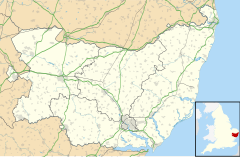Exning
| Exning | |
|---|---|
 Church of St Martin, Exning | |
Location within Suffolk | |
| Population | 1,960 (2011)[1] |
| District | |
| Shire county | |
| Region | |
| Country | England |
| Sovereign state | United Kingdom |
| Post town | Newmarket |
| Postcode district | CB8 |
Exning is a village and civil parish in the West Suffolk district of Suffolk in eastern England.
It lies just off the A14 trunk road, roughly 12 miles (19 km) east-northeast of Cambridge, and 10 miles (16 km) south-southeast of Ely. The nearest large town is Newmarket.
The most conspicuous building in Exning is the church of St Martin, which is visible from the A14.
History
[edit]Local lore reputes Exning to have been the capital of the Iceni tribe and therefore the home of Queen Boadicea (Boudicca).[2]
"The Island", a moated earthworks to the south of the parish is no longer visible following the building of the New Market bypass (originally part of the A45, before being redesignated the A14[3] in 1973.[4] This led to the destruction of the site and its consequential delisting as a scheduled monument. However the sit was examined before the destruction of the site.[3]
Exning is reputed to have been the birthplace of Saint Ethelreda, to whom the cathedral at Ely is dedicated, though this is disputed.
A spring at Exning was named St Wendreda's Well, and a local legend had it that the seventh-century Saint Wendreda used its water for healing. Newmarket jockeys used to take horses there to drink before a race.[5] At the time of William the Conqueror, Exning was in Staploe Hundred.[6] Later, the settlement was in the Liberty of Ely.[citation needed] When the powers of the Liberty were reduced, some of its territory returned to Suffolk, including Exning – albeit as a part of Lackford Hundred, where it would remain until the Victorian period. For several centuries, the part of Suffolk centred on Exning was almost an enclave of the county within the confines of Cambridgeshire.[7] The parish of Newmarket All Saints was transferred from Cambridgeshire to this virtual enclave in 1894, but it continued to be practically detached until boundary changes in the area widened considerably the "bridge" between it and the rest of Suffolk a hundred years later.[8]
The Rosery Hotel is an early Victorian building which was frequently visited by Queen Mary.
During the Second World War, the headquarters of No. 3 Group of RAF Bomber Command were located in Harraton House. Nearby Newmarket Heath, the northwest corner of which borders on Exning, was used as an airfield for, amongst others, Stirling III Bombers of No. 75 (NZ) Squadron RAF. Little evidence remains of this chapter in Exning's history, apart from a single aircraft hangar on Heath Road, Burwell (near the One Thousand Guineas Connect service station on the A14 trunk road) and a memorial plaque on the racecourse.
See also
[edit]- Landwade, a neighbouring village that was formerly in Cambridgeshire but is now part of Exning parish
References
[edit]- ^ "Civil Parish population 2011". Neighbourhood Statistics. Office for National Statistics. Archived from the original on 13 October 2016. Retrieved 20 August 2016.
- ^ "Exning History". Archived from the original on 2 September 2013. Retrieved 28 June 2013.
- ^ a b Birch, Mel (2004). Suffolk's Ancient Sites- Historic Places. Mendlesham: Castell Publishing. ISBN 0-948134-50-X.
- ^ "EXG 010 - The Island (Med) - Suffolk Heritage Explorer". heritage.suffolk.gov.uk. Retrieved 1 March 2024.
- ^ "Saint Wendreda: the story of a Saxon Princess". Fensmuseums.org.uk. Archived from the original on 10 April 2018. Retrieved 9 April 2018.
- ^ "Suffolk". Open Domesday. Archived from the original on 16 January 2019. Retrieved 8 April 2020.
- ^ "Current and historic counties". Ministry of Housing, Communities and Local Government. Retrieved 8 April 2020.
- ^ "The Cambridgeshire and Suffolk (County Boundaries) Order 1992". Legislation.gov.uk. Archived from the original on 13 December 2020. Retrieved 11 April 2020.
External links
[edit]- Exning Parish Council
- Exning history and pictures
- St Martin, Exning
- Photos of Exning today
- Exning Cricket Club
- Exning parish churches
- Walk Round Exning
